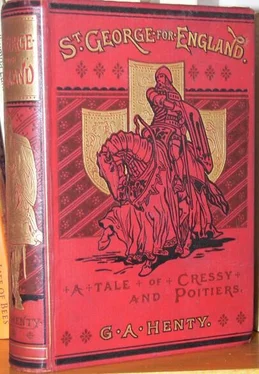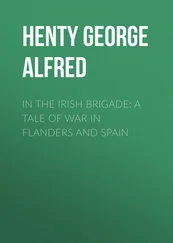G. Henty - St. George for England - A Tale of Cressy and Poitiers
Здесь есть возможность читать онлайн «G. Henty - St. George for England - A Tale of Cressy and Poitiers» весь текст электронной книги совершенно бесплатно (целиком полную версию без сокращений). В некоторых случаях можно слушать аудио, скачать через торрент в формате fb2 и присутствует краткое содержание. Жанр: Старинная литература, на английском языке. Описание произведения, (предисловие) а так же отзывы посетителей доступны на портале библиотеки ЛибКат.
- Название:St. George for England: A Tale of Cressy and Poitiers
- Автор:
- Жанр:
- Год:неизвестен
- ISBN:нет данных
- Рейтинг книги:3 / 5. Голосов: 1
-
Избранное:Добавить в избранное
- Отзывы:
-
Ваша оценка:
- 60
- 1
- 2
- 3
- 4
- 5
St. George for England: A Tale of Cressy and Poitiers: краткое содержание, описание и аннотация
Предлагаем к чтению аннотацию, описание, краткое содержание или предисловие (зависит от того, что написал сам автор книги «St. George for England: A Tale of Cressy and Poitiers»). Если вы не нашли необходимую информацию о книге — напишите в комментариях, мы постараемся отыскать её.
St. George for England: A Tale of Cressy and Poitiers — читать онлайн бесплатно полную книгу (весь текст) целиком
Ниже представлен текст книги, разбитый по страницам. Система сохранения места последней прочитанной страницы, позволяет с удобством читать онлайн бесплатно книгу «St. George for England: A Tale of Cressy and Poitiers», без необходимости каждый раз заново искать на чём Вы остановились. Поставьте закладку, и сможете в любой момент перейти на страницу, на которой закончили чтение.
Интервал:
Закладка:
Upon the following day Walter was called before the king, and related to him in full the incidents of the siege and of his captivity and escape; and the same day King Edward sent off a letter to Philip of Valois denouncing Sir Philip Holbeaut as a dishonored knight, and threatening retaliation upon the French prisoners in his hands.
A fortnight later an answer was received from the King of France saying that he had inquired into the matter, and had sent a seneschal, who had questioned Sir Philip Holbeaut and some of the men-at-arms in the castle, and that he found that King Edward had been grossly imposed upon by a fictitious tale. Sir Walter Somers had, he found, been treated with all knightly courtesy, and believing him to be an honorable knight and true to his word, but slight watch had been kept over him. He had basely taken advantage of this trust, and with the man-at-arms with him had escaped from the castle in order to avoid payment of his ransom, and had now invented these gross and wicked charges against Sir Philip Holbeaut as a cloak to his own dishonor.
Walter was furious when he heard the contents of this letter, and the king and Black Prince were no less indignant. Although they doubted him not for a moment, Walter begged that Ralph might be brought before them and examined strictly as to what had taken place, in order that they might see that his statements tallied exactly with those he had made.
When this had been done Walter obtained permission from the king to dispatch a cartel to Sir Philip de Holbeaut denouncing him as a perjured and dishonored knight and challenging him to meet him in mortal conflict at any time and place that he might name. At the same time the king dispatched a letter to Philip of Valois saying that the statements of the French knight and his followers were wholly untrue, and begging that a time might be appointed for the meeting of the two knights in the lists.
To this King Philip replied that he had ordered all private quarrels in France to be laid aside during the progress of the war, and that so long as an English foot remained upon French soil he would give no countenance to his knights throwing away the lives which they owed to France in private broils.
"You must wait, Sir Walter, you see," the king said, "until you may perchance meet him in the field of battle. In the mean time, to show how lightly I esteem the foul charge brought against you, and how much I hold and honor the bravery which you showed in defending the castle which my son the prince intrusted to you, as well as upon other occasions, I hereby promote you to the rank of knight banneret."
Events now passed slowly before Calais. Queen Philippa and many of her ladies crossed the Channel and joined her husband, and these added much to the gayety of the life in camp. The garrison at Calais was, it was known, in the sorest straits for the want of food, and at last the news came that the King of France, with a huge army of two hundred thousand men, was moving to its relief. They had gathered at Hesdin, at which rendezvous the king had arrived in the early part of April; but it was not until the 27th of July that the whole army was collected, and marching by slow steps advanced toward the English position.
King Edward had taken every precaution to guard all the approaches to the city. The ground was in most places too soft and sandy to admit of the construction of defensive works; but the fleet was drawn up close inshore to cover the line of sand-hills by the sea with arrows and war machines, while the passages of the marshes, which extended for a considerable distance round the town, were guarded by the Earl of Lancaster and a body of chosen troops, while the other approaches to the city were covered by the English camp.
The French reconnoitering parties found no way open to attack the English unless under grievous disadvantages. The Cardinals of Tusculum, St. John, and St. Paul endeavored to negotiate terms of peace, and commissioners on both sides met. The terms offered by Philip were, however, by no means so favorable as Edward, after his own victorious operations and those of his armies in Brittany and Guienne, had a right to expect, and the negotiations were broken off.
The following day the French king sent in a message to Edward saying that he had examined the ground in every direction in order to advance and give battle, but had found no means of doing so. He therefore summoned the king to come forth from the marshy ground in which he was encamped and to fight in the open plain; and he offered to send four French knights, who, with four English of the same rank, should choose a fair plain in the neighborhood, according to the usages of chivalry. Edward had little over thirty thousand men with him; but the same evening that Philip's challenge was received a body of seventeen thousand Flemings and English, detached from an army which had been doing good service on the borders of Flanders, succeeded in passing round the enemy's host and in effecting a junction with the king's army. Early the next morning, after having consulted with his officers, Edward returned an answer to the French king, saying that he agreed to his proposal, and inclosed a safe-conduct for any four French knights who might be appointed to arrange with the same number of English the place of battle.
The odds were indeed enormous, the French being four to one; but Edward, after the success of Cressy, which had been won by the Black Prince's division, which bore a still smaller proportion to the force engaging it, might well feel confident in the valor of his troops. His envoys, on arriving at the French camp, found that Philip had apparently changed his mind. He declined to discuss the matter with which they were charged, and spoke only of the terms upon which Edward would be willing to raise the siege of Calais. As they had no authority on this subject the English knights returned to their camp, where the news was received with great disappointment, so confident did all feel in their power to defeat the huge host of the French. But even greater was the astonishment the next morning, when, before daylight, the tents of the French were seen in one great flame, and it was found that the king and all his host were retreating at full speed. The Earls of Lancaster and Northampton, with a large body of horse, at once started in pursuit, and harassed the retreating army on its march toward Amiens.
No satisfactory reasons ever have been assigned for this extraordinary step on the part of the French king. He had been for months engaged in collecting a huge army, and he had now an opportunity of fighting the English in a fair field with a force four times as great as their own. The only means indeed of accounting for his conduct is by supposing him affected by temporary aberration of mind, which many other facts in his history render not improbable. The fits of rage so frequently recorded of him border upon madness, and a number of strange actions highly detrimental to his own interests which he committed can only be accounted for as the acts of a diseased mind. This view has been to some extent confirmed by the fact that less than half a century afterward insanity declared itself among his descendants.
A few hours after the departure of the French the French standard was lowered on the walls of Calais, and news was brought to Edward that the governor was upon the battlements and desired to speak with some officers of the besieging army. Sir Walter Manny and Lord Bisset were sent to confer with him, and found that his object was to obtain the best terms he could. The English knights, knowing the determination of the king on the subject, were forced to tell him that no possibility existed of conditions being granted, but that the king demanded their unconditional surrender, reserving to himself entirely the right whom to pardon and whom to put to death.
Читать дальшеИнтервал:
Закладка:
Похожие книги на «St. George for England: A Tale of Cressy and Poitiers»
Представляем Вашему вниманию похожие книги на «St. George for England: A Tale of Cressy and Poitiers» списком для выбора. Мы отобрали схожую по названию и смыслу литературу в надежде предоставить читателям больше вариантов отыскать новые, интересные, ещё непрочитанные произведения.
Обсуждение, отзывы о книге «St. George for England: A Tale of Cressy and Poitiers» и просто собственные мнения читателей. Оставьте ваши комментарии, напишите, что Вы думаете о произведении, его смысле или главных героях. Укажите что конкретно понравилось, а что нет, и почему Вы так считаете.












